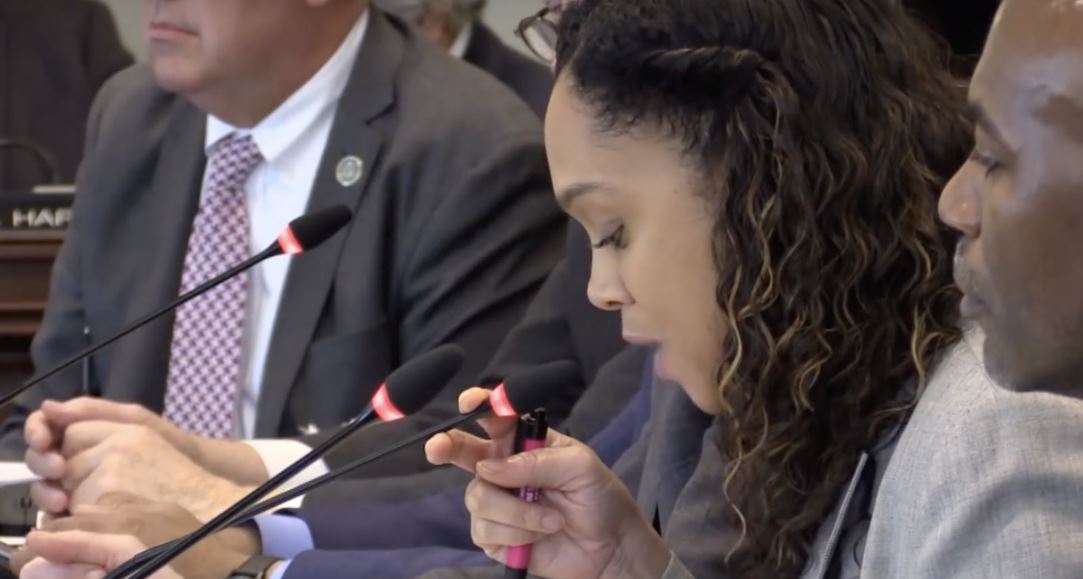[ad_1]
By Stephen Janis and Taya Graham, Special to the AFRO
The reception in Annapolis for Baltimore State’s Attorney Marilyn Mosby’s proposal that would give prosecutors more leeway in vacating wrongful convictions was chilly, to say the least.
“As prosecutors, it is our affirmative obligation to rectify and to right the wrongs of the past, the present and the future,’ Mosby testified before the house judiciary committee in support of bill 874.

But shortly after the city’s top prosecutor finished her impassioned pleadings on the proposed measure that would allow state’s attorney to re-open tainted cases, pushback ensued.
Testifying that the law would go too far, Caroline County State’s Attorney Joe Riley said the Maryland State’s Attorney’s Association would not support the bill.
“If you as the legislature wish to vacate all previous applicable possession of marijuana and paraphernalia cases, then you should do so,” Riley told the committee. “To leave this to individual jurisdictions is to ensure that inconsistent vacature of these convictions occurs.”
“It will assuredly politicize our discretion on the issue.”
The conflict between arguably the state’s most high-profile law enforcement official battling to rectify what many believe to be a sullied criminal justice system, highlights one of the key obstacles to law enforcement reform in the state capital, observers say.
In general, suburban more conservative districts tend to be skeptical of measures aimed to scrutinize policing and the laws that govern it in Baltimore. A long-standing tradition that coupled with the powerful influence of the police unions has made even incremental reform problematic.
The bill Mosby was touting seemed relatively straightforward. It would allow prosecutors to petition a judge to start a proceeding to vacate any conviction deemed problematic.
Currently, Mosby told the house judiciary committee that dozens of cases tainted by testimony from the corrupt Gun Trace Task Force are languishing because judges refuse to re-open standing convictions.
The Gun Trace Task Force was a group of eight officers who were convicted of or plead guilty to robbing residents, dealing drugs, and stealing overtime. The fallout from the scandal and a variety of other police misconduct cases have promoted Mosby to review roughly 2,000 past convictions.
“Prosecutors have the affirmative ethical and legal obligation to seek ‘justice over convictions,’ not only during the pre-trial stage and up to conviction but our ethical obligation also extends beyond a conviction to ensure the integrity of that conviction,” she said.
“We can’t afford to wait while there are individuals that are sitting in jail or walking around suffering the collateral consequences of wrongful convictions where their life, liberty and freedom are in jeopardy.”
The bill would also allow Mosby to clear past convictions for marijuana possession. Recently, she publicly vowed not to prosecute pot possession cases. It is a policy she argued was justified by the disproportionate application of pots laws against African-Americans.
“Out of the citywide (marijuana) citations that they were issuing 42 percent of those citations that were issued came out of Western District. This is Penn North. This is Sandtown-Winchester, “she said
The pushback came shortly after another indictment involving GTTF members was returned this week.
Prosecutors allege former Baltimore Police Sgt. Keith Allen Gladstone planted a BB gun on a Baltimore resident after he was struck by vehicle driven by a member of the GTTF. The charges allege the scheme was concocted to cover-up the fact the GTTF member had intentionally hit the suspect.
The Judiciary Committee has not yet voted on the measure.
Leaders of a Beautiful Struggle (LBS), a Baltimore policy think tank, is part of the messaging campaign to explain the merits of the new policy to the community of Baltimore.
“In terms of LBS, we’ve been supportive of it, in terms of the larger community, I think there are mixed reactions,” said Dayvon Love, the group’s director of public policy. “I think the mixture of reactions has to do with the notion that has been pretty commonplace that the ability to arrest and prosecute for drug crime were an important leg in public safety strategy. Part of the conversation has been about shifting people’s notion as to what is an effective public safety strategy away from the ‘cast a broad net’ to a more refined and really more humane approach to public safety that really focuses on the people that are the drivers of violence and crime.”
Despite the guarantee of the State’s Attorney’s Office, the Baltimore Police Department (BPD) continues apace with arrests for marijuana possession.
The BPD, the organization most directly involved in ameliorating the damage of dubious searches and reportedly pointless arrests, did not respond to the AFRO’s request for comment.
[ad_2]
Source link

